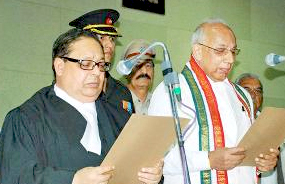
Chandigarh, Jul 27: Veteran BJP leader Kaptan Singh Solanki was sworn-in as the new governor of Haryana on Sunday.
Acting Chief Justice of Punjab and Haryana high court Ashutosh Mohunta administered the oath of office and secrecy to 75-year-old Solanki at the premises of Raj Bhawan here.
Solanki, a BJP Rajya Sabha member and a RSS leader, took oath in Hindi. He has become the 16th governor of the state since its formation after trifurcation of Punjab in 1966.
The former professor hails from Bhind district of Madhya Pradesh and was renominated to Rajya Sabha in August, 2012.
Solanki's predecessor Jagannath Pahadia's five year term had ended on Saturday.
Though chief minister Bhupinder Singh Hooda was present, his cabinet colleagues chose to skip the oath-taking ceremony.
Haryana BJP chief Ram Bilas Sharma and party's Ambala MP Rattan Lal Kataria were among the prominent saffron party leaders present on the occasion. Senior administration and police officers of Haryana and Union Territory of Chandigarh were also among the attendees.
After taking oath, in a brief interface with media, he parried questions on contentious Haryana Sikh Gurdwara Management Act promulgated by the state government recently.
Despite repeated queries on the issue, he refrained from commenting. He, however, said: "Today is a pious day as he took oath as governor as per the directives of the President (Pranab Mukherjee)."
The new governor is expected to look into the legality of the issue of Haryana forming a separate Gurdwara Management Committee, which Punjab has strongly objected to.
Haryana and Punjab are at loggerheads over the issue of a separate SGPC by the former after the passing of a new law by the state Assembly which was accorded assent by former governor Jagannath Pahadia.





Comments
Add new comment